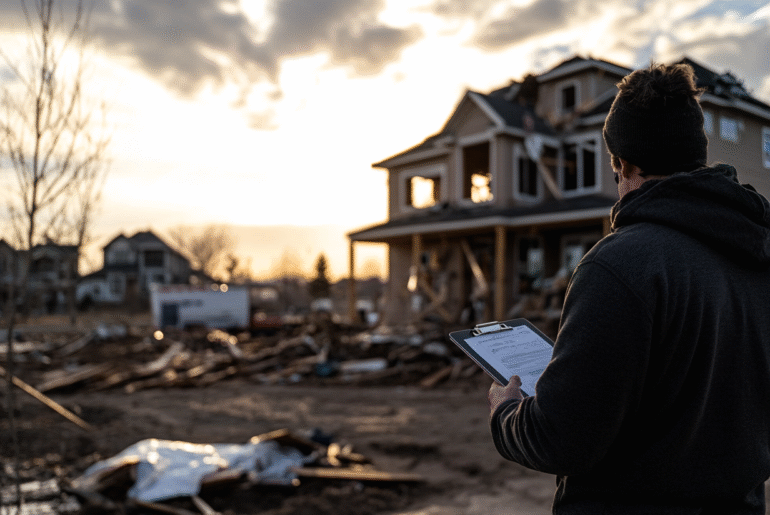This article may contain references to products or services from one or more of our advertisers or partners. We may receive compensation when you click on links to those products or services. Nonetheless, our opinions are our own.
The information presented in this article is accurate to the best of our knowledge at the time of publication. However, information is subject to change, and no guarantees are made about the continued accuracy or completeness of this content after its publication date.
- Highlights
- Identifying Financial Risks During a Disaster
- Building an Emergency Fund That Fits Your Life
- Protecting Your Finances When a Crisis Hits
- Recovering Financially After a Disaster
- Adjusting Your Financial Plans Post-Disaster
- Preparing in Advance for Future Financial Challenges
- Strategies for Safeguarding Your Financial Documents
- Final Thoughts
- Frequently Asked Questions
- Recommended Reads
Highlights
When disaster hits—be it a flood, medical emergency, or job loss—the financial consequences can be swift and severe. Taking proactive steps now can help shield you from long-term hardship. This guide outlines specific strategies for building resilience through emergency funds, document security, and updated financial planning.
Identifying Financial Risks During a Disaster
Common Threats to Financial Stability
Unexpected disasters bring both emotional and financial turmoil. Beyond immediate costs, longer-term financial strain can emerge if you’re unprepared.
Here are major financial risks to be aware of:
- Property Damage: Repair costs often exceed initial expectations, especially after natural disasters.
- Loss of Income: Reduced hours or unemployment can disrupt your monthly budget.
- Emergency Expenses: Medical bills or urgent repairs can appear without warning.
- Insurance Gaps: Standard policies may exclude certain events, leaving you to cover the shortfall.
Recognizing these possibilities allows you to form a more responsive and protective financial strategy.
Building an Emergency Fund That Fits Your Life
How to Start Saving for Uncertainty
Emergency funds are the foundation of financial resilience. The ideal savings amount often ranges from three to six months of living expenses, but your specific needs may differ.
Steps to Build Your Fund:
- Compile Your Monthly Expenses: Include housing, groceries, utilities, insurance, and health care.
- Evaluate Job Security: If your role or industry is unstable, consider saving toward the higher end.
- Factor in Dependents: Family responsibilities and medical conditions may require additional planning.
High-yield savings accounts offer a good balance of accessibility and growth potential. Keep this fund separate from regular savings to avoid accidental use.
Protecting Your Finances When a Crisis Hits
A strong emergency fund provides more than money—it delivers peace of mind. Knowing you’ve allocated funds for three to six months of essentials lets you focus on recovery, not scrambling for resources.
To stay ready:
- Reassess your fund annually based on income or lifestyle changes.
- Automate contributions to maintain consistency.
- Ensure the account allows for immediate access without penalties.
Voted "Best Overall Budgeting App" by Forbes and WSJ
Monarch Money helps you budget, track spending, set goals, and plan your financial future—all in one app.
Get 50% OFF your first year with code MONARCHVIP
Recovering Financially After a Disaster
Steps to Take Immediately After an Event
After a disaster, immediate action sets the tone for your recovery. Start by fully documenting any damages or losses.
What to Do:
- Take photos and write descriptions of all affected property.
- Contact your insurance provider promptly and gather all necessary paperwork.
- Reach out to FEMA or relevant state agencies for assistance programs.
- Use resources from the National Association of Insurance Commissioners to better understand your coverage rights.
Long-Term Adjustments After Recovery
Financial recovery also includes revisiting your approach to future planning.
Consider the following:
- Strengthen your emergency fund.
- Reevaluate your insurance for additional coverage.
- Explore financial literacy tools or classes to improve future decision-making.
Access to professional financial counseling or nonprofit recovery programs can provide added support during this period.
Adjusting Your Financial Plans Post-Disaster
Evaluating Your New Financial Landscape
Once the immediate crisis has passed, review your finances to adapt to any permanent changes.
Key Actions:
- Create a Revised Budget: Adjust for new expenses or reduced income.
- Communicate with Creditors: Notify lenders early to explore options like deferred payments or reduced rates.
- Stay Alert to Scams: Only work with verified aid organizations and service providers. Always research before sharing personal or banking information.
Preparing in Advance for Future Financial Challenges
Create an Emergency Financial First Aid Kit
Preparation helps reduce chaos during a crisis. Gather vital documents and contacts into a single, easily accessible location.
Your kit should include:
- Insurance policies
- Bank account information
- Medical records
- Emergency contact numbers (bank, insurance agent, utility companies, local emergency services)
Strategies for Safeguarding Your Financial Documents
Where and How to Store Critical Information
Protecting your documents ensures that your recovery process isn’t delayed by lost or damaged paperwork.
Recommended Storage Methods:
- Use a Safe Deposit Box: Store originals in a secure, climate-resistant location.
- Create Digital Backups: Scan and store files on external hard drives or encrypted cloud storage.
- Follow CFPB Guidelines: The Consumer Financial Protection Bureau provides resources to help you organize and secure your records.
Final Thoughts
Financial disasters rarely arrive with a warning, but preparation can reduce both damage and stress. Whether it’s building an emergency fund, updating your insurance, or securing vital documents, taking action now sets you up for stability in the future. The stronger your financial safety net, the better your ability to recover and rebuild.
Frequently Asked Questions
How much should I save in an emergency fund?
Aim to save three to six months’ worth of essential living expenses, though the amount can vary based on your job stability and financial responsibilities.
What documents should go in an emergency financial kit?
Include insurance policies, identification, medical information, bank details, and contact numbers for financial and emergency services.
How do I file for disaster assistance?
Document all losses and contact your insurance provider first. Then apply for aid through FEMA or local relief programs. Keep records of every step.
What should I do if I suspect a post-disaster scam?
Verify credentials of individuals or organizations before sharing information. Report suspected fraud to your state’s attorney general or the FTC.

Reviewed and edited by Albert Fang.
See a typo or want to suggest an edit/revision to the content? Use the contact us form to provide feedback.
At FangWallet, we value editorial integrity and open collaboration in curating quality content for readers to enjoy. Much appreciated for the assist.
Did you like our article and find it insightful? We encourage sharing the article link with family and friends to benefit as well - better yet, sharing on social media. Thank you for the support! 🍉
Article Title: How to Protect Money and Recover Quickly After Disaster
https://fangwallet.com/2025/05/20/protect-money-and-recover-quickly-after-disaster/The FangWallet Promise
FangWallet is an editorially independent resource - founded on breaking down challenging financial concepts for anyone to understand since 2014. While we adhere to editorial integrity, note that this post may contain references to products from our partners.
The FangWallet promise is always to have your best interest in mind and be transparent and honest about the financial picture.
Become an Insider

Subscribe to get a free daily budget planner printable to help get your money on track!
Make passive money the right way. No spam.
Editorial Disclaimer: The editorial content on this page is not provided by any of the companies mentioned. The opinions expressed here are the author's alone.
The content of this website is for informational purposes only and does not represent investment advice, or an offer or solicitation to buy or sell any security, investment, or product. Investors are encouraged to do their own due diligence, and, if necessary, consult professional advising before making any investment decisions. Investing involves a high degree of risk, and financial losses may occur including the potential loss of principal.
Source Citation References:
+ Inspo
There are no additional citations or references to note for this article at this time.












































